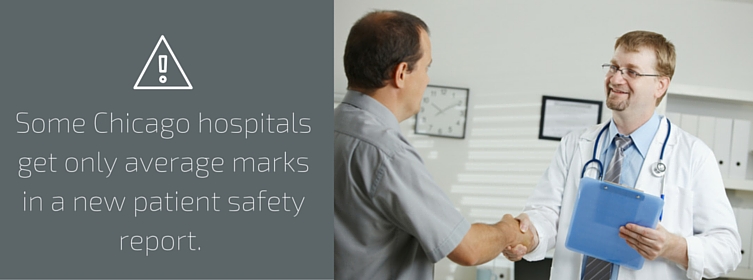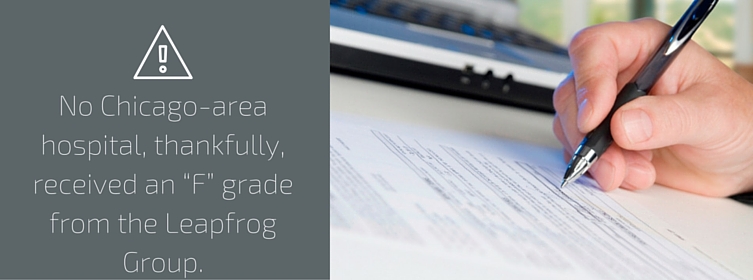Depending on where you get your information, medical malpractice in hospitals in the United States is responsible for between 98,000 and 440,000 deaths annually. If you need to stay in a hospital, your choice might literally mean the difference between life and death. If you’re injured in a hospital in Illinois – or if your health deteriorates – because of medical malpractice, seek advice from an experienced Chicago medical malpractice attorney. Medical malpractice victims in Illinois are entitled to full compensation for their injuries and related losses.
Some Chicago hospitals get only average marks in a new patient safety report. Leapfrog Group, a Washington, D.C. nonprofit that monitors safety and quality in U.S. hospitals, gave Chicago-area hospitals grades of A through F in its most recent “Hospital Safety Score” report, gauging hospitals’ track records of preventing avoidable deaths due to causes like infections and miscommunication. The good news is that many Chicago-area hospitals rated highly. Scores are assigned by patient safety experts and are based on information mostly from 2015 and 2014 compiled from the American Hospital Association, Medicare, and the hospitals themselves.
WHICH HOSPITALS WERE RANKED CHICAGO’S BEST?
The Chicago area hospitals that received “A” grades from Leapfrog Group are Rush University Medical Center, Presence Saints Mary and Elizabeth Medical Center, the University of Chicago Medical Center, Advocate Illinois Masonic Medical Center, Loretto Hospital, West Suburban Medical Center in Oak Park, Swedish Covenant Hospital, Loyola Gottlieb Memorial Hospital, the AMITA Adventist Medical Centers in La Grange and Hinsdale, Elmhurst Memorial Hospital in Elmhurst, and Advocate Lutheran General Hospital in Park Ridge.
Other facilities that received an “A” include St. Catherine Hospital of East Chicago, Advocate Good Samaritan Hospital in Downers Grove, the AMITA Health Adventist Medical Center in Glendale Heights, the AMITA Health Alexian Brothers Medical Center in Elk Grove Village, the Community Hospital of Munster, Northwest Community Hospital in Arlington Heights, and the AMITA Health Adventist Medical Center in Bolingbrook.
Leapfrog Group also assigned an “A” grade to Northwestern Medicine Central DuPage Hospital in Winfield, Edward Hospital in Naperville, Silver Cross Hospital in New Lenox, the AMITA Health St. Alexius Medical Center in Hoffman Estates, Rush-Copley Medical Center in Aurora, Advocate Condell Medical Center in Libertyville, Northwestern Medicine Delnor Hospital in Geneva, and Advocate Sherman Hospital in Elgin.
The Chicago-area hospitals receiving a “B” grade included Jackson Park Hospital, Presence Resurrection Medical Center, MacNeal Hospital in Berwyn, Loyola University Medical Center in Maywood, Advocate Christ Medical Center in Oak Lawn, Westlake Hospital in Melrose Park, Presence Saint Francis Hospital in Evanston, Advocate South Suburban Hospital in Hazel Crest, St. Mary Medical Center of Hobart, the Presence St. Joseph Medical Center in Joliet, Advocate Good Shepherd Hospital in Barrington, Presence Mercy Medical Center in Aurora, Presence Saint Joseph Hospital in Elgin, and Vista Medical Center East in Waukegan.
Leapfrog Group gave a grade of “C” to Mercy Hospital and Medical Center, the University of Illinois Hospital, John H. Stroger Jr. Hospital, Advocate Trinity Hospital, Saint Anthony Hospital, Northwestern Memorial Hospital, Roseland Community Hospital, Norwegian American Hospital, Presence Saint Joseph Hospital, Thorek Memorial Hospital, Community First Medical Center, and Weiss Memorial Hospital.
Also receiving a “C” grade were Rush Oak Park Hospital, the Little Company of Mary Hospital and Health Care Centers in Evergreen Park, MetroSouth Medical Center (Blue Island), the NorthShore University HealthSystem Hospitals in Evanston, Skokie, Glenview, and Highland Park, Palos Community Hospital in Palos Heights, Ingalls Memorial Hospital in Harvey, the Methodist Hospitals of Merrillville Northlake in Gary, the Methodist Hospitals of Merrillville Southlake in Merrillville, and Northwestern Lake Forest Hospital.
WHICH HOSPITALS WERE RANKED NEAR THE BOTTOM?
While the Leapfrog Group assigned grades of “C” or higher to the overwhelming majority of hospitals in the Chicago area, several facilities received a “D” grade, including Mount Sinai Hospital, Holy Cross Hospital, and Franciscan St. James Health in Olympia Fields and in Chicago Heights. No Chicago-area hospital, thankfully, received an “F” grade from the Leapfrog Group.
WHAT SHOULD A MEDICAL MALPRACTICE VICTIM KNOW?
If you are injured in any hospital in the Chicago area, your injury is not automatically considered medical malpractice. Illinois law does not presuppose that when someone is injured while under a physician’s care, the physician is automatically liable for the injury. Instead, the injury victim must prove that a doctor or other healthcare provider acted negligently in a way that directly caused the injury. If you are injured by medical malpractice and you choose to file a medical malpractice lawsuit, keep in mind these facts:
- Under the Illinois statute of limitations, with rare exceptions, a victim of medical malpractice only has up to two years from the date he or she knew or should have known of the injury to file a medical malpractice claim.
- If you are injured while receiving medical care in Illinois, it does not necessarily mean that medical malpractice has happened. To prove medical malpractice, a victim must show that a healthcare provider breached the accepted standard of care by acting carelessly or negligently.
- Three of the top five most trusted groups in the United States, according to a number of surveys, are doctors, nurses, and pharmacists. If jurors have any doubt about the claims in a malpractice trial, they will usually defer to the healthcare professionals.
- Keep and make copies of all the medical and insurance paperwork generated by your injury and by your claim. Keep complete records and obtain your own medical records when you believe that you are a medical malpractice victim.
- When you explain your case – even to your own lawyer – keep it to the basic facts. You should be able to tell others briefly and specifically how medical malpractice happened and how it has affected you; otherwise, jurors may not be able to understand your claim.
There are no risk-free medical procedures. Physicians must make it clear to patients what the possible risks are. Only when someone entirely comprehends the risks should that person choose to have a medical procedure. Most doctors work diligently to reduce risk. Nevertheless, medical negligence still happens far too frequently in hospitals in Illinois and across the country, and far too many victims in the Chicago area still end up seeking legal help from a Chicago medical malpractice attorney.









